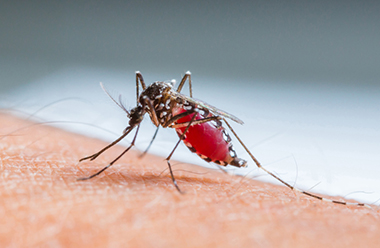Medical Director Recommends Education on Zika Virus
 |
|
The Zika virus is transmitted to people primarily through the bite of an infected mosquito. |
ALBANY, N.Y. (Feb. 18, 2016) – This is the time of year when students make plans to travel during spring break. Student Health Services Medical Director Rebecca Kobos, M.D., advises students as well as faculty and staff, to learn more about the Zika virus, especially if they are planning travel to areas where the mosquito-borne illness has been reported.
Zika is transmitted to people primarily through the bite of an infected mosquito. Other mosquito borne viral infections include Chikungunya and Dengue. There is also evidence that the Zika virus can be sexually transmitted.
About one in five people infected with Zika virus show symptoms, which are usually mild and may include a sudden onset of fever, rash, joint pain, and pink eye. Severe disease requiring hospitalization is rare. No specific antiviral treatment is available and treatment includes rest, fluids, and acetaminophen as needed.
As the virus spreads throughout the Western Hemisphere, concerns are growing for pregnant women because the virus has been linked to microcephaly, a serious birth defect characterized by an abnormally small head and brain in infants. The World Health Organization has termed the spread of Zika virus a “global health emergency.”
In recent days, the U.S. Food and Drug Administration (FDA) has issued new recommendations that those at risk of having been infected with the Zika virus should not donate blood for four weeks. The FDA recommended on Tuesday that blood should no longer be collected from regions where the Zika virus is circulating, and that blood needed for transfusions be obtained from areas of the country without active transmission.
The Centers for Disease Control and Prevention (CDC) has issued travel alerts for pregnant women in 30 countries with reported active transmission of Zika virus. The travel alerts include Brazil, Colombia, El Salvador, French Guiana, Guatemala, Haiti, Honduras, Martinique, Mexico, Panama, Paraguay, Suriname, Venezuela, and the Commonwealth of Puerto Rico. More information is available at CDC Travel Guidance.
Recommendations:
• Anyone planning travel to areas where Zika virus is reported is encouraged to visit the CDC website and learn more about Zika.
• Pregnant travelers to areas with Zika transmission should postpone their travel.
• Anyone returning from Zika affected areas, if sexually active, should use condoms for all sexual contact to decrease the risk of transmission to partners.
• Anyone traveling to areas with Zika transmission should take steps to prevent mosquito bites.
![]() For more news, subscribe to UAlbany's RSS headline feeds
For more news, subscribe to UAlbany's RSS headline feeds
A comprehensive public research university, the University at Albany-SUNY offers more than 120 undergraduate majors and minors and 125 master's, doctoral and graduate certificate programs. UAlbany is a leader among all New York State colleges and universities in such diverse fields as atmospheric and environmental sciences, business, education, public health,health sciences, criminal justice, emergency preparedness, engineering and applied sciences, informatics, public administration, social welfare and sociology, taught by an extensive roster of faculty experts. It also offers expanded academic and research opportunities for students through an affiliation with Albany Law School. With a curriculum enhanced by 600 study-abroad opportunities, UAlbany launches great careers.


